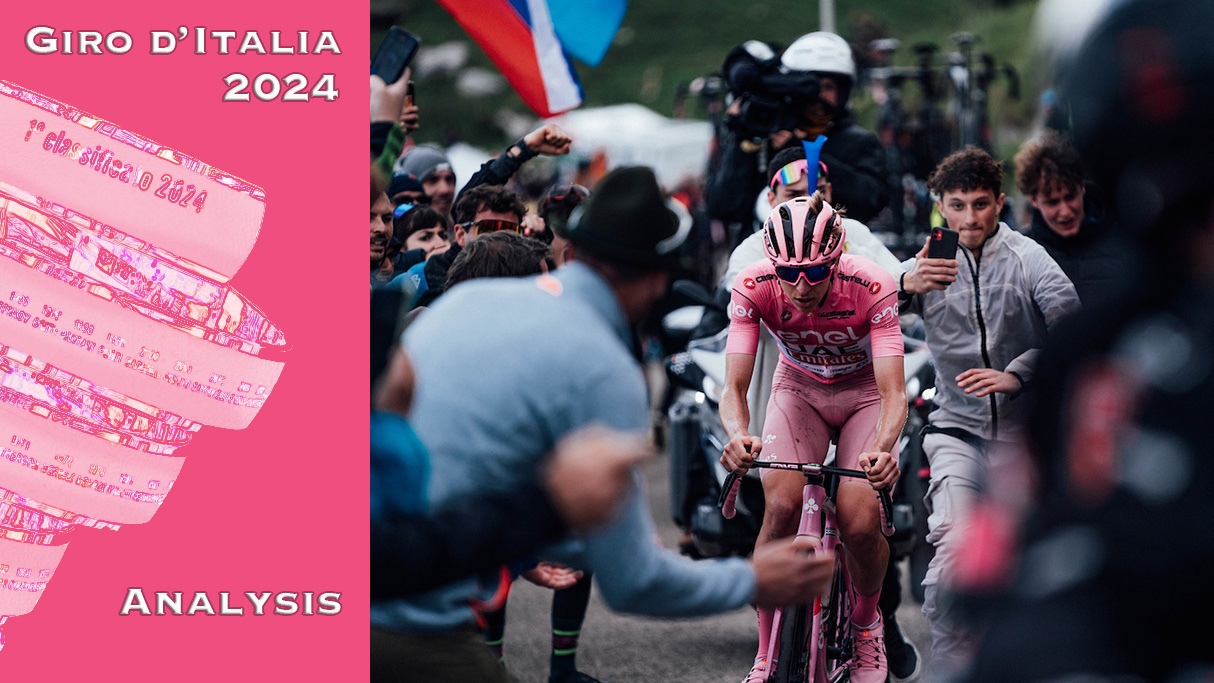
The Giro d’Italia usually produces a thousand subplots. This year, every strand of the narrative seemed to be knotted around Tadej Pogačar's dominance. Rarely in the history of this race has one man dictated the temperature quite like this.
At every turn from Turin to Rome, Pogačar was in the frame. Indeed, only a smart sprint from Jhonatan Narváez (Ineos Grenadiers) denied the rider from UAE Team Emirates the historic feat of leading the Giro from start to finish. In the mountains, from Oropa to Monte Grappa, nobody could so much as lay a glove on Pogačar.
His range extended to the time trial, where he beat Filippo Ganna (Ineos Grenadiers) in Perugia and pushed him all the way at Desenzano del Garda, and even to the sprint stages, where he tried to upset the fast men with a late attack on the road to Fossano.
It wasn’t all Pogačar all the time, of course. The on-form Narváez sparkled throughout, including on the gripping finale in Naples. Julian Alaphilippe’s stylish victory in Fano, and the Soudal-QuickStep rider's day-long alliance of circumstance with Mirco Maestri (Polti Kometa), will go down as one of the high points of the 2024 season.
Giulio Pellizzari (VF Group-Bardiani CSF-Faizanè) underlined his potential, while Antonio Tiberi (Bahrain Victorious), fifth overall and best young rider, confirmed his quality. Italy has few guarantees in the post-Nibali era, but it does have some hope, after all. The sprint field was a deep one, with Jonathan Milan (Lidl-Trek) the outstanding performer, but Tim Merlier (Soudal QuickStep) also held up his end.
Geraint Thomas (Ineos Grenadiers) clocked up his third Grand Tour podium finish in three years, a striking feat for a rider who seemed to have been deemed almost surplus to requirements at Ineos Grenadiers at times. Daniel Martínez (Bora-Hansgrohe) proved he could last the distance over three weeks with his first GT podium finish.
And yet, all those stories, compelling as they were, are doomed to be eclipsed in posterity by the disquieting hegemony of Pogačar, who was operating in an entirely different stratosphere, winning in Rome by almost ten minutes. As the curtain comes down on the Giro, Cyclingnews looks at some of the defining moments of his triumph.
Pogačar’s fast start

During Tiger Woods’ imperial phase, some competitions made efforts to ‘Tiger-proof’ their courses in a bid to quell his dominance. The philosophy certainly didn’t form part of RCS Sport’s thinking when they learned of Tadej Pogačar’s presence at this year’s Giro.
Not content with placing a full-blown summit finish on the second day, the organisation made an alteration to the route of stage 1 during the winter, adding the late climb of the Bivio di San Vito just 3km from the finish in Turin. The precise opposite of ‘Tadej-proofing’ the Giro, this was an open invitation for the Slovenian to try to lead the race from start to finish.
And try Pogačar inevitably did. His searing attack on the San Vito splintered the front group as per the anticipated script, but Jhonatan Narváez was not content to be a bit-part player in the Giro’s opening act. The Ecuadorian somehow held Pogačar’s wheel on the climb and then beat him in the sprint on the banks of the Po. Pogačar’s frustration was palpable when he went to warm down on the rollers without a word for the waiting press.
Narváez’s unexpected success created the fleeting impression that this Giro might not be run entirely on Pogačar’s terms after all, though the illusion scarcely lasted 24 hours. At Oropa, and despite a low-speed crash at the base of the climb, Pogačar ripped clear of the rest to claim stage honours and his first maglia rosa.
Normal service had been resumed, yet even then, Pogačar didn’t seem entirely satisfied on the mountaintop that evening. Perhaps he had expected even heftier time gaps, or perhaps he still hadn’t entirely digested the upset in Turin.
Whatever the reason, the early onslaught continued on the flat run-in to Fossano on stage 3 the next day, when Pogačar launched a surprise attack that only Geraint Thomas could follow, and even the Welshman had to yield in the final kilometre.
Pogačar made it to within sight of the line before he was swept up, but even though his heist didn’t come off, he wore a smile when he sat before the press that evening, as if he had confirmed to himself that he could do pretty much as he pleased on his Giro. Asked if he was planning to try to win every stage from there to Rome, he simply grinned: “No comment.” (BR)
Pogačar ends race as a contest in Perugia time trial
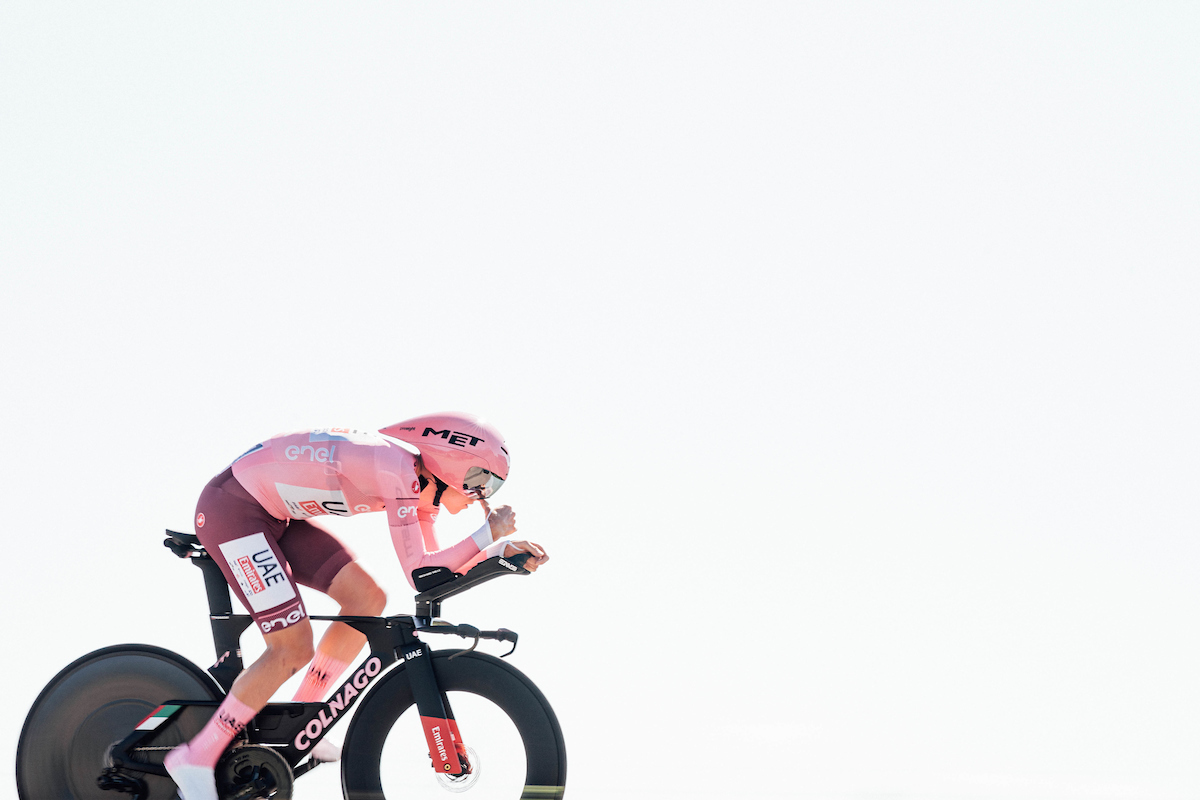
Throughout the first week, there had been a quiet but palpable confidence emanating from UAE Team Emirates about the stage 7 time trial to Perugia. On more than one occasion, members of management absent-mindedly spoke of assessing the size of Pogačar’s advantage after Perugia, seemingly already certain that there was no way he could possibly lose pink there.
The confidence was striking given that Pogačar had, at least relative to his otherworldly prowess elsewhere, betrayed distinct signs of drift in the discipline in recent years. Since that startling performance against the watch at La Planche des Belles Filles in 2020, after all, he had rolled down the start ramp in sixteen time trials and emerged victorious just once, in Laval in the opening week of the 2021 Tour de France.
Before the Giro began, Thomas might have thought the two time trials offered him a chance to make a contest of this race. Instead, Perugia was essentially the moment Pogačar put any thought of challenging for the maglia rosa far beyond the wildest imaginations of anybody else in the race.
Indeed, not content with putting daylight into all his putative rivals – 1:48 on Daniel Martínez (Bora-Hansgrohe), 2:00 on Thomas, 2:08 on Ben O’Connor (Decathlon AG2R La Mondiale) – Pogačar proceeded to beat Filippo Ganna to the stage win for good measure. UAE had calculated that Pogačar needed to be within 40 seconds of Ganna before the climb into Perugia in order to take victory. As it turned out, he was 47 seconds down at that point, but it scarcely mattered, given the supersonic pace he produced on the final ascent.
Barring accident or illness, the Giro was already Pogačar’s, but even at this point, he already seemed to be racing with his mind firmly on future rivals. The Tour features two pivotal time trials. The stages to Perugia, and to Desenzano del Garda a week later, were a chance for Pogačar to road test the tweaks to his position over the winter, but above all, it was a striking flex before he faces Jonas Vingegaard (Visma-Lease a Bike), Remco Evenepoel (Soudal-Quickstep) and Primož Roglič (Bora-Hansgrohe) against the watch in July. (BR)
Sharing the pie and fighting over the crumbs
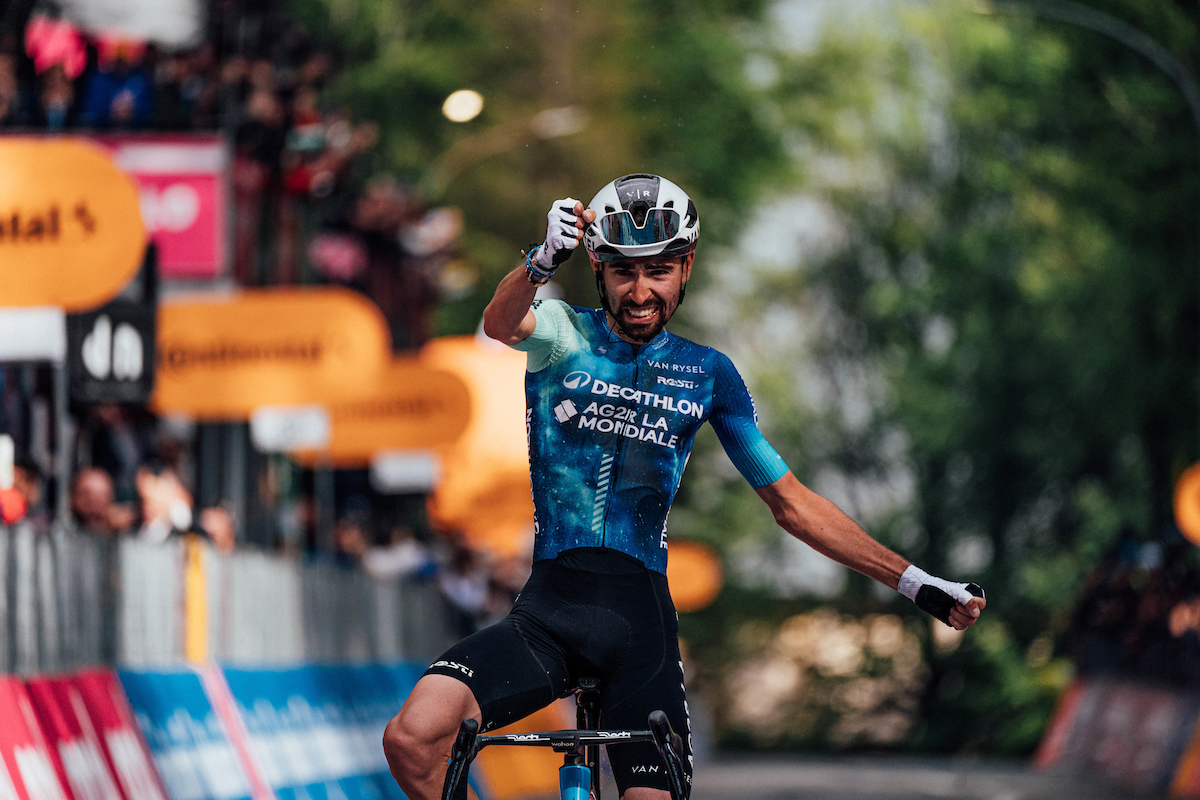
Before the Giro began, everybody accepted that Pogačar would be without rival. Vincenzo Nibali wasn’t alone in wondering, however, if his overwhelming supremacy might eventually prove to be a hindrance. “Tadej is the favourite, and we all know he’s the strongest,” Nibali told Cyclingnews. “But he still has one disadvantage at this race – he doesn’t have allies.”
Grand Tour history is dotted with dominant winners who maintained their empires by creating allies through the concession of favours and stage wins, the kind of quid pro quo that has always been a part of the intricate tapestry of this curious sport. Miguel Induráin’s 1990s hegemony was predicated in part on his philosophy of allowing everybody a chance to drink from the well. That idea persisted well into the Team Sky era, with the British team rarely inclined to strain too hard for stage wins once they had seized the overall lead.
Pogačar, on the other hand, has long held a firmly Merckxian view of the world, believing that bike races are there to be won rather than bartered. After Pogačar won three stages in the opening week, the gruppo expected the beatings to continue when the race resumed on stage 10 to Bocca della Selva.
Instead, UAE Team Emirates opted to give the breakaway the latitude to stay clear. On the final climb, meanwhile, Pogačar’s guard even allowed Damiano Caruso to take up the reins of the pink jersey group for his Bahrain Victorious teammate Antonio Tiberi.
In the press conference truck afterwards, Pogačar’s demeanour indicated that this was a temporary trend rather than a wholesale change in philosophy. “If I’m honest, I would say in a nice way that everybody is happy,” Pogačar began, offering cycling’s version of José Mourinho’s indelible “I prefer not to speak” post-match interview.
Asked to expand on that opening gambit, Pogačar confessed that he had not been particularly happy with how the day had gone. “In my opinion, it would have been better just to go how we wanted to the finish, but sometimes there’s too many people in the peloton saying that we need to share a piece of pie,” he said.
Reaction to the comment exposed the outlines of a mild culture war within the Giro gruppo. At least one veteran rider had expressed his annoyance to UAE Team Emirates management during the first week about their insatiable appetite for chasing down the break. Others, like Caruso, simply accepted that Pogačar was not in the habit of handing out gifts. “For some people, it could be a problem, but in the cycling of today, the strongest rider wins,” Caruso said. “There aren’t agreements or things like that.”
Pogačar’s extravagant supremacy meant that he had little need to create allies for himself here, but as the Giro progressed, he and his team eventually seemed to settle upon a modern compromise on the issue. In the latter part of the race, they more or less advertised in advance the stages that they were trying to win.
In the final reckoning, Pogačar’s hefty appetite – he finished with six stage wins – was only a part of the problem. With so few stages of intermediate difficulty on the route, there were relatively few clear opportunities for a break to go the distance. Once Pogačar and the sprinters had helped themselves to their slices of the pie, the rest were subsisting on crumbs. (BR)
Yet another extreme weather polemica between the race organisers and the riders
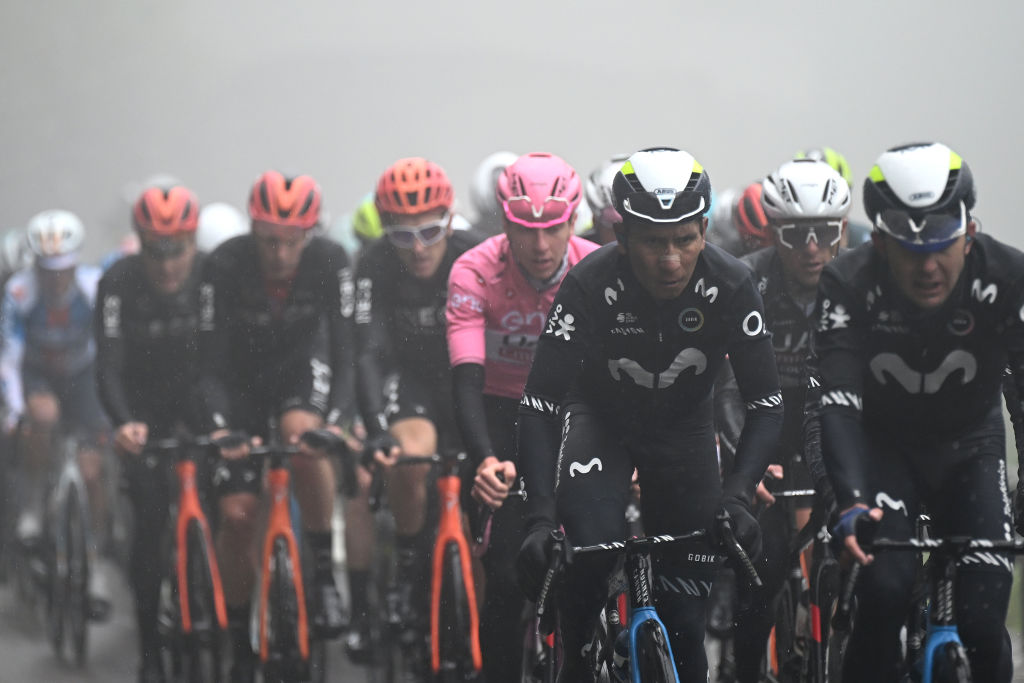
The Giro’s visit to Livigno was supposed to show off the ski and cycling resort to the world but will be remembered for the latest polemica and fallout between race organisers RCS Sport and the riders.
Livigno reportedly paid €400,000 to host the stage 15 finish at the Mottolino ski and mountain bike station, where Pogačar dominated yet again to celebrate his own personal links to the high-altitude resort. The riders then enjoyed the rest day in Livigno, but behind the scenes, a storm was brewing in every sense of the word.
The weather changed dramatically on Monday, with snow falling on the 2,485m high Umbrailpass. Riders’ association the CPA pushed for the Umbrailpass to be removed from the stage but RCS Sport wanted to challenge nature itself and the worsening weather by having the stage go ahead as planned. The whole polemica could have been avoided but RCS Sport wanted to enforce their authority and wait until the morning of the stage before making a final decision on riding over the Umbrailpass.
Rider safety seemed to be their secondary concern, even when snow began to fall in Livigno as the peloton signed on for the stage on Tuesday morning. Just like every time there is a dispute about racing in extreme weather at the Giro, the last-minute meetings became tense and threatening, with RCS Sport convinced they could make the riders race.
Previous extreme weather disputes mean RCS Sport’s relationship with the CPA and new president Adam Hansen is tense. Vegni is no fan of Hansen’s love of tweeting his thoughts and decisions via social media. Cyclingnews understands the meetings were often tense, with heated words and threats exchanged.
Ben O’Connor described the RCS Sport management as “dinosaurs” for wanting to go against the wishes and a vote by the riders. The delay in making a final decision on the morning of the stage created confusion in the peloton and around the world, the embarrassment and apparent lack of unity again making a mockery of the sport.
RCS Sport failed to understand the new unity in the peloton created by the hard work of Hansen and the national rider associations, while the riders failed to understand the complexity and implications of changing a stage.
When the Swiss authorities closed the Umbrailpass due to snow, RCS Sport wanted the riders to cover a ceremonial 18km loop around Livigno to appease the local mayor and ensure they got their stage start money. But riding in the snow for half an hour before jumping into team cars for a transfer around the Umbrailpass was a preposterous idea and the riders refused to do it, even if Hansen had agreed on the idea.
The polemica ended with the Giro driving away from Livigno in the snow and under a cloud of threats of potential legal action. The riders were more united than ever, RCS Sport was angrier than ever, and the sport had made itself look foolish yet again. (SF)
All hail Emperor Pogačar
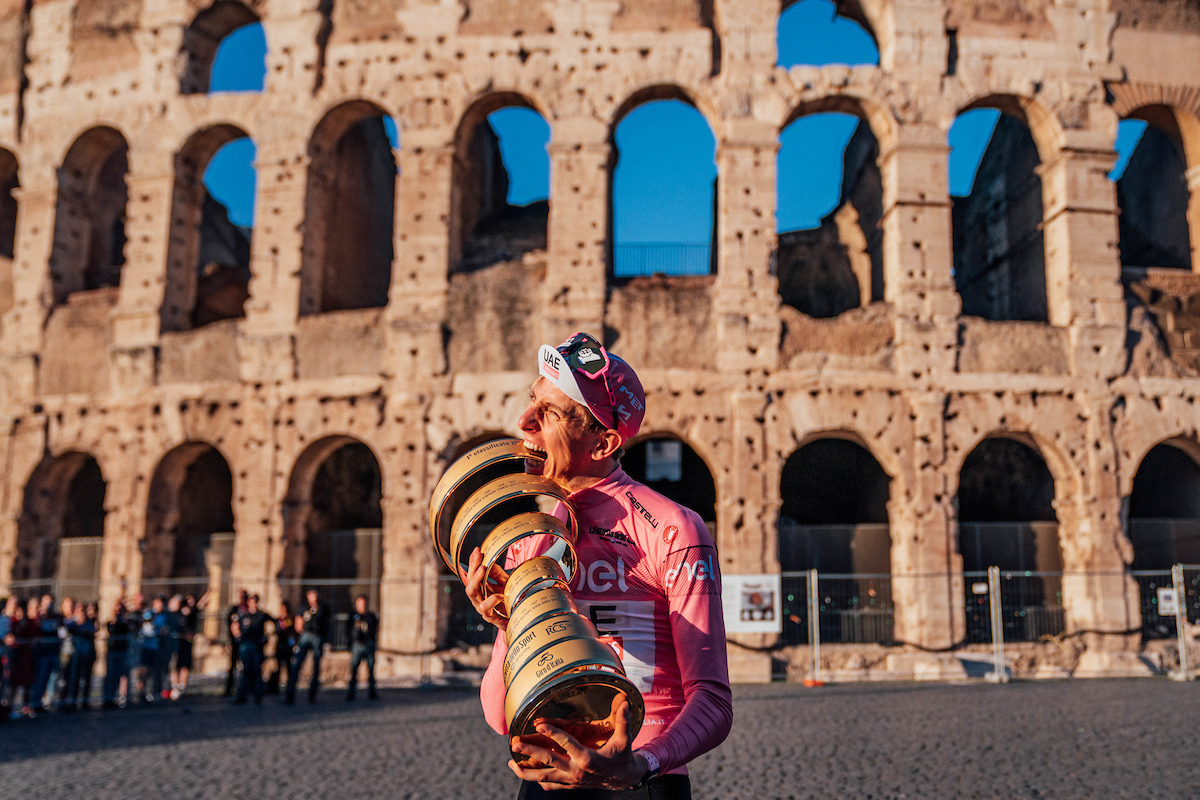
Pogačar started the third week of the Giro as he ended the second: winning a mountain stage in the maglia rosa, this time on the steep finish of Monte Pana at the foot of the Dolomites, and totally dominating the general classification.
His fifth stage victory and fourth in the maglia rosa turned the page on the Livigno polemica. Then for much of the week, Pogačar let the baroudeur riders like Julian Alaphilippe (Soudal-QuickStep), Georg Steinhauser (EF Education-EasyPost) and Andrea Vendrame (Decathlon AG2R) take the limelight and enjoyed a day off when the sprinters took control of the flat stage to Padova and Tim Merlier (Soudal-QuickStep) edged out Jonathan Milan (Lidl-Trek) in the sprint.
Pogačar saved himself for Saturday's final mountain stage and the spectacular double climb of Monte Grappa. 48 hours beforehand, he hinted that he wanted to win a fifth stage in the maglia rosa there and called the Slovenian fans to come and witness his impresa.
They came in their thousands and packed the climb along with the Italian tifosi. Pogačar stepped up as if his domination and a fifth victory in pink were all part of his contract with RCS Sport. It was expected, inevitable but all the same breathtaking and thrilling to watch.
It was Pogcar at his very best in a moment of triumph. He gained two more minutes on his overall rivals, all while smiling his way to victory, high-fiving a young fan and giving a bidon to another. He really is a cannibal with a human heart.
Pogačar’s 10-minute winning margin in Rome has not been seen since Vittorio Adorni back in 1965. He spent 20 days in pink, with only Costante Girardengo, Eddy Merckx and Gianni Bugno doing better by leading the Giro from start to finish. Yet not even Merckx finished on the podium of each of his Grand Tour debuts. Other riders have won more stages in a single Giro, but nobody has ever finished on the podium of the Giro and Tour five times while still under the age of 26.
Rome crowned the Slovenian as ‘Emperor Pogačar’ on Sunday as the sun began to set over the eternal city and the 2024 Giro d’Italia. He can now enjoy a few days at home. The next stop is the Tour de France, to try to complete a historic Grand Tour double. (SF)







